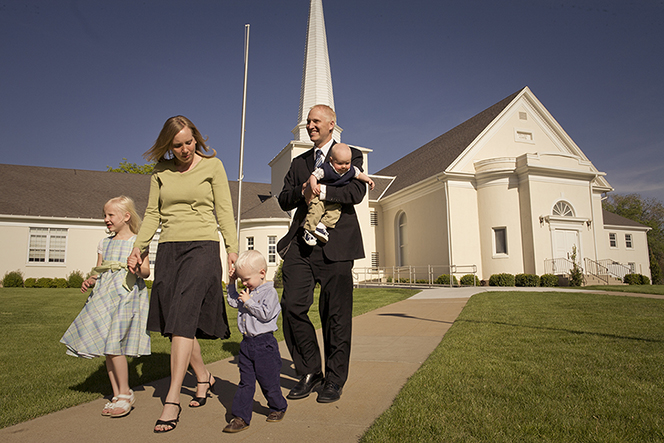Does religion help you live longer?
A Harvard study confirms perceptions of a link between going to church and good health

Women who attended religious services more than once per week are more than 30 percent less likely to die during a 16-year-follow-up than women who never attended, according to a study from Harvard T.H. Chan School of Public Health. Frequent attendees also had significantly lower risk both from cardiovascular- and cancer-related mortality. A link with substantially lower breast cancer mortality was particularly striking.
The study was published earlier this month in the journal JAMA Internal Medicine.
“Our results suggest that there may be something important about religious service attendance beyond solitary spirituality,” said Tyler VanderWeele, professor of epidemiology at Harvard Chan School and senior author of the study. “Part of the benefit seems to be that attending religious services increases social support, discourages smoking, decreases depression, and helps people develop a more optimistic or hopeful outlook on life.”
Nearly 40 percent of Americans report attending religious services once per week or more. Previous studies have suggested a link between attendance and reduced mortality risk, but many were criticized for major limitations, including the possibility of “reverse causation”—that only those who are healthy can attend services, so that attendance isn’t necessarily influencing health.
The new study addressed these criticisms by using rigorous methodology that controlled for common causes of attendance and mortality, used a larger sample size, and had repeated measurements over time of both attendance and health.
The researchers looked at data from 1992-2012 from 74,534 women who participated in the Nurses’ Health Study. The women answered questionnaires about their diet, lifestyle, and health every two years, and about their religious service attendance every four years. The researchers adjusted for a variety of factors, including diet, physical activity, alcohol consumption, smoking status, body mass index, social integration, depression, race and ethnicity.
Compared with women who never attended religious services, women who attended more than once per week had 33 percent lower mortality risk during the study period and lived an average of five months longer, the study found. Those who attended weekly had 26 percent lower risk and those who attended less than once a week had 13 percent lower risk.
The study also found that women who attended religious services once per week or more had a decreased risk of both cardiovascular mortality (27 percent) and cancer mortality (21 percent).
One limitation of the study is that it consisted mainly of white Christians and therefore might not be generalizable to the general population, other countries, or areas with limited religious freedom. In addition, the study population included only American nurses of a similar socioeconomic status, who tend to be fairly health conscious.
The researchers concluded that the perception that “religious” people are healthier has empirical support. However, nothing about the truth of religion can be concluded from this. “Our results do not imply that health care professionals should prescribe attendance at religious services,” they wrote, “but for those who already hold religious beliefs, attendance at services could be encouraged as a form of meaningful social participation.”
In an accompanying commentary on the research, a researcher from Duke University Medical Center, in North Carolina, praised the article as a “major contribution”, but admitted that it was not conclusive. Attendance at religious services may not be correlated with the strength of one’s religious belief or spirituality. Younger Americans tend to rely less upon attending religious services to nourish their spirituality.
As the authors point out, young adult spirituality tends to be either moral (being good and nice), therapeutic (primarily concerned with one’s own happiness), or deistic (relating to a higher being who is distant and not involved). This approach is quite different from conventional Protestant and Catholic beliefs that service attendance is an important marker of religion or spirituality.
Michael Cook is editor of MercatorNet.

Facebook has about 1.6 billion monthly users, about 200 million of them in the United States. It's obviously a great platform for influencing public opinion in an election year. One election strategist says that Facebook is “more than seven times more effective at converting undecided voters than direct mail”.
In recent days the company has had to deny that it has stacked the deck, as it were, against conservatives in its trending news feed. But the allegations have created a public relations crisis for the world's biggest social network. In our lead article today,Jeffrey Pawlick explains some of the technology behind the growing influence of social media.

Michael Cook
Editor
MERCATORNET
 | Facebook, surveillance capitalism, and feedback control
Jeffrey Pawlick | CONNECTING | 24 May 2016
How data analytics has gone from measuring to controlling reality
Read more... |
 | How to get your kids to obey
Mary Cooney | FAMILY EDGE | 24 May 2016
Age-appropriate goals for instilling an important virtue.
Read more... |
 | A new portrait of American slavery emerges
Joshua Rothman | FEATURES | 24 May 2016
Over the years, slave-owners placed 200,000 newspaper ads for escaped slaves
Read more... |
 | Does religion help you live longer?
Michael Cook | ABOVE | 24 May 2016
A Harvard study confirms perceptions of a link between going to church and good health
Read more... |
Suite 12A, Level 2, 5 George Street, North Strathfied NSW 2137, Australia
Designed by elleston
New Media Foundation | Suite 12A, Level 2, 5 George St | North Strathfield NSW 2137 | AUSTRALIA | +61 2 8005 8605





















.png)












No hay comentarios:
Publicar un comentario